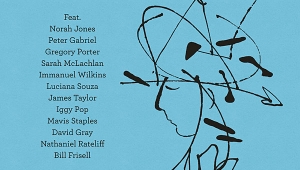| Columns Retired Columns & Blogs |
Recording of October 2000: Red Dirt Girl
EMMYLOU HARRIS: Red Dirt Girl
Nonesuch 79616-2 (CD). 2000. Malcolm Burn, prod., eng. AAD? TT: 55:58
Performance ****?
Sonics ****
Still, studio records are what artistically advance a musical career, and when it came time to make the follow-up to the ethereal, distinctive Wrecking Ball, Harris, who in recent interviews has said she didn't want to make "The Son of Wrecking Ball," decided to write her way into a fresh artistic direction.
Nonesuch 79616-2 (CD). 2000. Malcolm Burn, prod., eng. AAD? TT: 55:58
Performance ****?
Sonics ****
Since her last studio album, 1995's Wrecking Ball, Emmylou Harris has been part of five different recording projects: Willie Nelson's Teatro, the Ronstadt/Parton/Harris collaboration Trio 2, the Gram Parsons tribute Return of the Grievous Angel, her own live album Spyboy, and the Ronstadt/Harris duo project Western Wall. She's been busy.
 | |
Fifteen years ago, Harris wrote and released an entire LP's worth of songs, The Ballad of Sally Rose. That concept album was far and away the worst commercial stumble in Harris' long career. Listening to Sally Rose today, however, it doesn't seem nearly the bomb that critics, and Harris herself, have ever since made it out to be. Nevertheless, the crash of Sally Rose may have been what convinced Harris to not attempt songwriting again...until now. Seven of Red Dirt Girl's 12 tracks are hers alone, and four others were co-written. Patty Griffin's "One Big Love" is the only cover.
Obviously, Harris has contributed ideas and interpretations to the many songs she's covered over the years. And being friends with, and often the voice for, songwriters like Guy Clark, Neil Young, and Jackson Browne, to name a few, has given her more than a passing facility for songwriting. Still, for someone who's not an everyday songwriter, Red Dirt Girl is quite an achievement. It may be the fact that Harris has never written songs regularly, that she's a relative newcomer with no bad habits or cherished, well-worn formats that she can fall back on (a common songwriter malaise), that gives this collection of originals its fresh individuality.
The opener, "The Pearl," hovers around the idea of how pain—that sand in the oyster—can ultimately become beautiful, and its lyrics set to a sturdy, lilting melody that brings back memories of Wrecking Ball.
Wisely, Harris didn't jettison everything about that earlier record for this project. Returning to New Orleans to record, she also asked Malcolm Burn, who engineered the earlier album, to sit in the producer's chair. With both the N'awlins and Burn factors at work, it's no great surprise that Red Dirt Girl retains some of the open spaces, layered production, and ethereal spookiness that made Wrecking Ball so powerful. In her songwriting, Harris has also chosen to stay in the modern electric and electronic folk-country, keyboard-driven vein she first discovered, albeit via other writers, on the earlier album.
Some of the singing modes she discovered or perfected on Wrecking Ball are also here as well. In "Michelangelo," for example, which Harris has said came to her in a dream, she returns to the wordless, soaring vocal accents that were such a memorable part of Wrecking Ball's opening track, "Where Will I Be." Jill Cunniff, who co-wrote Western Wall's single, "Sweet Spot," with Harris, returns on keyboards and as co-writer on "I Don't Want to Talk About It Now"—a grittier number, both lyrically and in terms of its slow-grind rhythms, and whose intentions are clear from its first quatrain: "God knows I need you / Like a user needs a drug / And I'll never be free of you / You are poison in my blood." Cunniff's presence adds a rhythmic vitality that is also very noticeable on her other co-write with Harris here, "J'ai Fait Tout."
The title tune, another Harris original, is a poignant tale of a good-hearted loser from Meridian, Alabama. Its detailed lyrics easily negotiate a number of impressively difficult twists, and never better than in the second verse: "She loved her brother / I remember back when / he was fixin' up a '49 Indian / told her little sister / going to ride the wind / up around the moon and back again / he never got farther than Vietnam / I was standing there with her when the telegraph come / poor Lillian... / now he's lying somewhere about a million miles from Meridian."
"Red Dirt Girl" is also one of the places where the guitar tones of Buddy Miller shine. A brilliantly talented player and producer, Miller continues to be one of the more indescribable and highly sought talents, and recently split time between the bands of Harris and Steve Earle while also making gorgeous albums, both solo and for his wife, Julie.
Another key contributor is Ethan Johns, son of producer Glyn and a guitar player, who also appeared on Western Wall. His middle eastern-flavored string work on "My Baby Needs a Shepherd" transforms a tune with obvious Celtic lyrics ("too-rah-loo-rah") into a multi-cultural success.
The album's songwriting highlight is Harris' paean to her recently deceased father, Bang the Drum Slowly, co-written with Guy Clark. Here the layered keyboards and vocal airiness of Wrecking Ball reappear to create a rolling, majestic, hymn-like splendor. Harris' wiliness as a veteran of more than 30 years in the business—and, with the release of Red Dirt Girl, an equal number of albums—rises again in the sweet "My Antonia," another Harris original in which Dave Matthews, whose name recognition will help her connect with a younger generation of fans, sings every other verse, and harmonizes with Harris on the choruses.
Harris is an artist's artist: a favorite of those who love authentic, hard-to-classify music, and a towering presence in today's music. With Red Dirt Girl she's added the category of "songwriter"—a memorable, coverable, accomplished songwriter—to an already transcendent résumé.—Robert Baird
- Log in or register to post comments




































